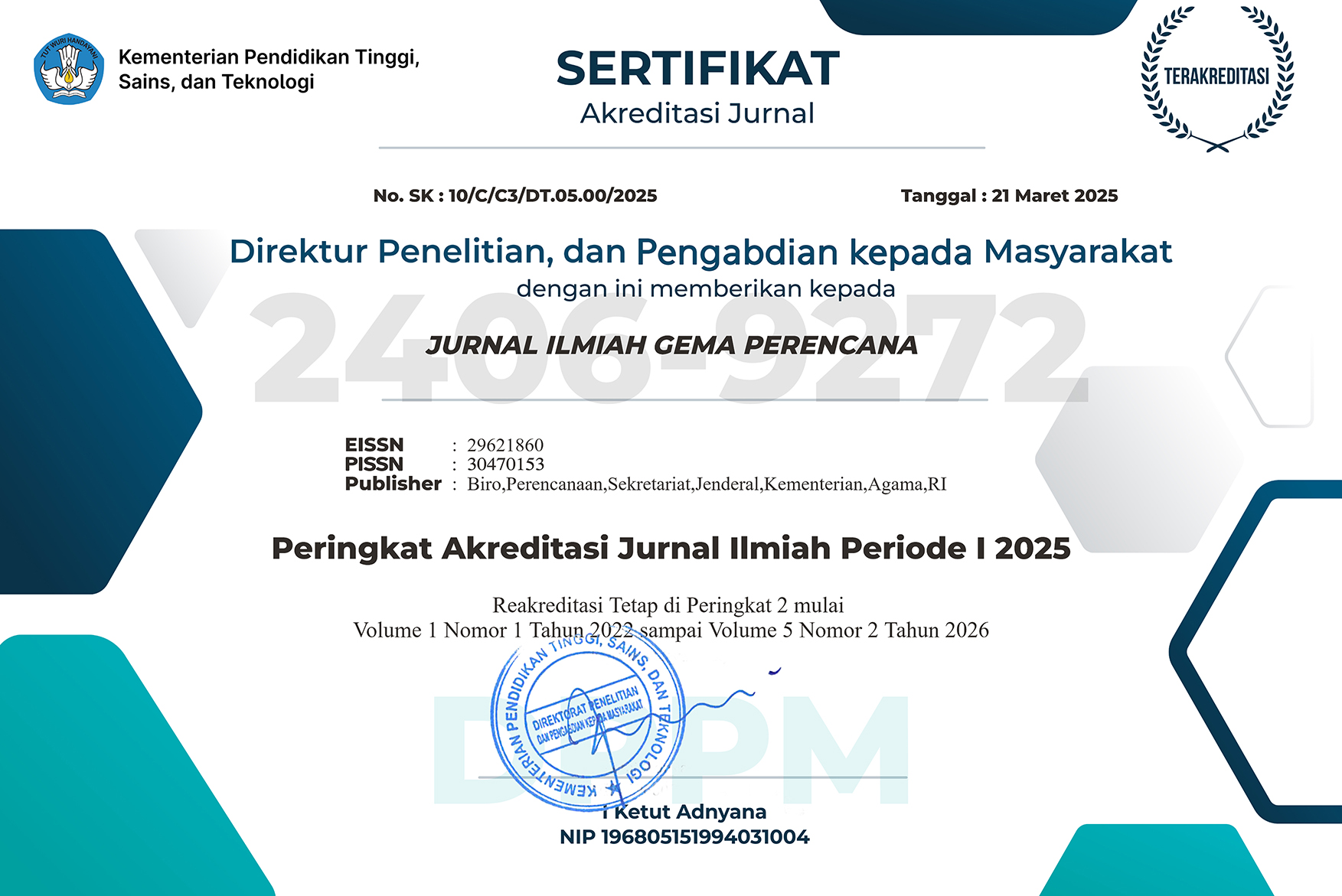Optimizing the Quality of Islamic Religious Education: Needs Analysis and Effective Supervision Strategies in Nganjuk Regency
DOI:
https://doi.org/10.61860/jigp.v4i2.274Abstract
This policy article comprehensively analyzes the problems of Islamic Religious Education (PAI) supervision and formulates effective strategies to improve the quality of education in Nganjuk Regency. The background of the problem indicates a structural imbalance between the number of PAI supervisors and the educational institutions they are supposed to supervise, resulting in low supervisory effectiveness. This imbalance is exacerbated by the delay in the appointment of new supervisors despite their qualifications, as well as the administrative implications for the payment of teacher professional allowances. This article uses a qualitative method with a descriptive analysis approach and USG analysis, as well as William Dunn's theory. Theoretically, this condition contradicts the concept of modern supervision, which emphasizes the role of supervisors as facilitators and instructional leaders. Limited resources and high workloads result in supervision tending to be sporadic and focused on administration rather than substantive development. These findings indicate the need for strategic policy interventions. Therefore, this article recommends three main strategies: 1) simplifying the bureaucratic process for appointing supervisors, 2) optimizing the allocation and workload of existing supervisors, and 3) developing a community-based supervision model. By implementing this strategy, it is hoped that the PAI supervision system in Nganjuk Regency can become more professional, effective, and sustainable, which will ultimately significantly improve the quality of PAI learning
Downloads
References
Armstrong, M. (2006). A Handbook of Human Resource Management Practice. Kogan Page.
Bush, T. (2011). Theories of Educational Leadership and Management. SAGE Publications.
Dessler, G. (2017). Human Resource Management. Pearson
Direktorat Jenderal Pendidikan Islam. (2018). Pedoman Pengawasan Pendidikan Agama Islam pada Sekolah Umum. Kementerian Agama Republik Indonesia.
Direktorat Jenderal Pendidikan Islam Nomor 697 Tahun 2025 Tentang Juknis Tunjangan Profesi Guru dan Pengawas Pendidikan Agama Islam
Dwiyanto, A. (2006). Mewujudkan Good Governance Melalui Pelayanan Publik. UGM Press.
Fayol, H. (1949). General and industrial management. Sir Isaac Pitman & Sons.
Glickman, C. D., Gordon, S. P., & Ross-Gordon, J. M. (2004). SuperVision and Instructional Leadership. Allyn & Bacon.
https://journal.staialandina.ac.id/index.php/sharia/article/view/29
Huda, N., & Anwar, M. (2021). Peran Pengawas Pendidikan Agama Islam dalam Peningkatan Kualitas Pendidikan Karakter Siswa. Jurnal Pendidikan Islam, 10(2), 145-160.
Jamil, M., & Mustofa, S. (2021). Pengawasan Pendidikan Agama Islam di Era Disrupsi: Tantangan dan Solusi. Jurnal Manajemen Pendidikan Islam, 6(1), 75-90.
Kemendikbud-Ristek (BNSP, 2021) Perubahan atas Peraturan Pemerintah Nomor 57 Tahun 2021 tentang Standar Nasional Pendidikan
Keputusan Dirjen Pendis Nomor 697 Tahun 2025 Tentang Juknis TPG Guru dan Pengawas Pendidikan Agama Islam
Peraturan Menteri Agama Nomor 16 Tahun 2020 tentang Pendidikan Agama Islam pada Sekolah. Jakarta: Kementerian Agama Republik Indonesia.
Owens, R. G., & Valesky, T. C. (2011). Organizational Behavior in Education. Pearson.
Peraturan Menteri Pendidikan, Kebudayaan, Riset, dan Teknologi Nomor. 4 Tahun 2022 Tentang Petunjuk Teknis Pemberian Tunjangan Profesi, Tunjangan Khusus, dan Tambahan Penghasilan Guru Aparatur Sipil Negara di Daerah Provinsi, Kabupaten/kota
Peraturan Menteri Pendayagunaan Aparatur Negara dan Reformasi Birokrasi Nomor 21 Tahun 2010 Tentang Jabatan Fungsional Pengawas Sekolah.
Peraturan Menteri Agama Nomor 31 Tahun 2013 tentang Perubahan Atas Peraturan Menteri Agama Nomor 2 Tahun 2012 Tentang Pengawas Madrasah Dan Pengawas Pendidikan Agama Islam Pada Sekolah
Peraturan Pemerintah No. 11 Tahun 2017 tentang Manajemen ASN
Sagala, S. (2010). Supervisi Pembelajaran. Alfabeta.
Setiawan, A., & Yuliani, D. (2022). Analisis Beban Kerja Pengawas Pendidikan Agama Islam dan Implikasinya terhadap Mutu Pembelajaran. Jurnal Edukasi Islam, 11(3), 201-215.
UNDP (1997). Governance for Sustainable Human Development.
Downloads
Published
How to Cite
Issue
Section
License
Copyright (c) 2025 Lutfiatus Zuhroh

This work is licensed under a Creative Commons Attribution 4.0 International License.






